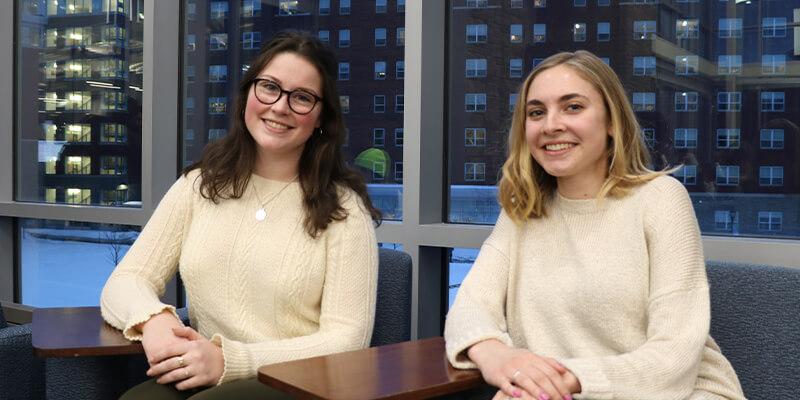Megan Holt ‘22 and Lauren Maus ’20 completed their Anthropology 174 Culture, Health and Healing class last semester. Following winter break, they were called back for an encore—an opportunity to present their class research project to an interested audience of Larner Medical School faculty and students.
The result of their project was an executive summary for Larner’s Global Health Program (LCOM) emphasizing the importance of injecting the traditional medical school curriculum with global health perspectives.
“There’s a lot of hard science students have to do in med school,” notes Holt, a biology major who is planning on a medical career herself. “We found that global health—actually experiencing what it means to deliver medical care in developing countries—gives students a more wholistic view of medicine.”
Anthropology 174 represents an increasing number of classes in the College of Arts and Sciences that integrate service learning with traditional classroom study and research. In addition to their exams and papers, students connect with community partners in a range of non-profit organizations from Larner, to Age Well Vermont, to the Committee on Temporary Shelter (COTS).
“Students combine theoretical learning with a project that has benefits for the community,” says course instructor Jeanne Shea, associate professor of anthropology and co-director of the College’s health and society major. “it provides them with insight into what it takes to solve real-world problems.”
* * *
Over the summer Shea reached out to local non-profit and governmental organizations and asked them if there were concrete needs her students to could help meet. Eventually she recruited 17 community partners seeking help in a variety of areas including staff training, assessment, media projects, or research that could be used to improve practices.
When the fall semester opened, students in Shea’s class broke up into teams and went to work. Cali Murray ‘20 and Gabriella Rivas ‘22 created a year-long diversity calendar of events for the Refugee Health/Health Equity Program in the Vermont Department of Health. Five other students collaborated on a video highlighting vaping on the UVM campus. Produced for UVM’s Center for Health and Wellbeing Vape-Free, the video incorporates student perspectives—vapers and non-vapers alike—to inform prevention programs on campus.
Holt and Maus formed a student team with Luke Urbina ’21 (who is studying abroad this semester). Their first challenge was the logistics of gathering data.
“That was the first big learning experience: the logistics involved in designing a study,” said Maus. “We were collaborating amongst ourselves, and with students and administrators at Larner. We got really good at organizing our work in Google docs.”
* * *
The trio conducted a survey and completed in-person interviews with med students who had participated in Larner’s Global Health Program. The program features a six-week elective practicing medicine in the Dominican Republic, Russia, Uganda, Vietnam or Zimbabwe.
Maus, who is majoring in anthropology and geography, was impressed with the transformative experiences many of the LCOM students described. The students were encouraged to work within the healthcare system already in place, while sharing their skills and perspectives and being open to new knowledge.
“They told us developing a relationship with patients in another culture was a really important skill that could help them practice in many setting in the U.S.,” Maus said.
Mariah McNamara, assistant professor at Larner and a LCOM committee member, served as the community partner for the Anthro 174 students. She says the executive summary will be useful in Larner’s efforts to attract more medical students with an interest in public health.
“We really want to highlight that the public health perspective is an integral part of education in medical school, not just a secondary benefit,” she said. “It’s an important piece of medical education we want to continue to support.
For Holt, who is looking forward to applying to medical school soon, the learning went both ways.
“A personal lesson for me is that it’s important to be culturally humble. Practicing medicine in other cultures helps you be sensitive to the cultural and context they live in, and that leads to better patient outcomes.”
